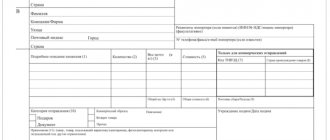Trust property management
An agreement under which the right to manage property is transferred to an appointed person for a specific period is defined by lawyers as a special agreement for trust management of property.
Such a document is considered official and requires strict implementation. It begins to operate from the time the property is transferred to the appointed trustee.
The terms of the property trust management agreement are paid.
An important condition of such a document is the amount of the bonus to the trustee. The document will not be considered executed if the payment system for the required remuneration is not agreed upon.
In principle, there are no special obstacles to concluding a gratuitous contract. However, all conditions must be specified in the contract; they are indicated in a separate paragraph.
The content of a property trust management agreement must necessarily include rules prescribing the relationship between the principal and the manager. The resulting legal relations can simultaneously relate to several beneficiaries.
The property trust management agreement is based on a specific legal framework. Each lawyer understands it differently. Very often, lawyers try to discover a “material legal substrate” in the existing trust management. As a result, they begin to qualify the agreement of trust management of property as a semblance of a certain instance of property law.
Such attempts amount to ignoring civil law, which is divided into two groups:
- Real;
- Required.
https://youtu.be/SM-AxHysClU
Transfer of property into trust management - taxation
When organizing accounting for trust management of property, one should be guided by the following standards:
- clause 1 art. 1018 Civil Code of the Russian Federation;
- Order of the Ministry of Finance of the Russian Federation dated November 28, 2001 No. 97n.
After concluding an agreement with the owner of the property, the manager has an obligation to maintain separate records of the assets entrusted to him.
That is, the manager must maintain basic accounting of his own commercial activities and at the same time keep separate records of transactions with the property entrusted to him, including:
- prepare financial statements at the end of each reporting period;
- draw up a report from which the property owner could see the amount of assets and liabilities, the level of income and expenses related to the disposal of the property.
Important!
The manager uses account 79 to record the fact of receipt of property for trust management. The manager's accountant is obliged to follow the provisions of the accounting policies of the property owner.
It is important to remember that managers are not able to pay taxes in accordance with the special tax regimes for PSN and UTII.
Property tax
According to paragraph 1 of Art. 378 of the Tax Code of the Russian Federation, the manager of the entrusted property does not have to pay property tax in relation to this property. Contributions to the budget must still be made by the full owner of the property.
Value added tax
A person who has received the status of a manager after concluding a property trust management agreement is required to calculate and pay VAT. When making transactions for the sale of goods, works and services, the manager must issue invoices and make entries in the purchase and sales ledger. If the invoice is issued to the counterparty manager, VAT can be deducted.
According to the instructions of paragraph 5 of Art. 174.1 of the Tax Code of the Russian Federation, the property manager is obliged to draw up and submit to the Federal Tax Service of the Russian Federation (at the place of registration of the manager) a VAT declaration at the end of the reporting period in relation to each of the trust management agreements. The owner of the assets is not required to calculate VAT and submit reports.
Land tax
If land plots have been transferred to trust management, the manager does not have to pay land tax. According to the instructions of paragraph 1 of Art. 388 of the Tax Code of the Russian Federation, payers of land tax are:
- owners who have title to land;
- holders of the right of lifelong inheritable ownership;
- users of land on the basis of a contract of perpetual use.
Income tax
In the text of Art. 322 of the Tax Code of the Russian Federation states that the manager is obliged to record income and expenses in accounting for activities related to the property entrusted to him in order to ensure the correctness of taxation of profits.
Important!
The costs of paying remuneration to the manager under a trust management agreement always remain an expense item for the owner of the property; the amount of remuneration does not participate in the calculation of income tax for the beneficiary, if the beneficiary is another person who is not the owner of the property.
Tax calculations must be carried out using the accrual method, and nothing else. The procedure for calculating income tax will depend on the terms of the agreement with the property owner:
- if the owner of the property is not listed as a beneficiary in the agreement, the expenditure and income base for the objects are used to calculate the tax base for tax purposes for the beneficiary;
- if the rightful owner of the property is the beneficiary, the manager must regularly submit reports to him with information on the amounts of income/expenses for the objects. The owner will take this information into account when determining the composition of non-operating income and expenses.
Property trust management agreement, features and purposes
When the owner transfers his own property to a specific person for management, a trust agreement for property management is drawn up between them. This property is always transferred to individual management and pursues one goal, to obtain greater profits and achieve maximum effect from its use.
Sometimes the object is transferred as trust management of the property of the ward. It can represent an individual, being an entrepreneur, and so on. This happens in the absence of persons who are obliged to take care and look after the individual
The participants of this document are:
- Owner of the property;
- Confidant;
- Beneficiary. If this person does not appear in the document, then all profits pass into the hands of the founder of the management.
Only certain categories of citizens are allowed to be trusted managers of the property of individuals:
- Individual entrepreneurs;
- Legal organizations, commercial type.
The logic of such actions is clear, because the work of a manager is similar to entrepreneurial activity.
Such agreements are very similar to conducting transactions. After all, an agent, similar to a trustee, becomes a representative of the interests of a particular party.
Trust management of securities
Guarantees of safety of client funds
Trust management of securities implies guarantees of high return on investment. The broker is the guarantor of the safety of the client’s funds. The client’s funds are in the clearing house of the exchange, securities are in the settlement depository of the exchange, the broker only keeps records of the movement of funds and securities of the client, and also calculates and withholds income tax. The larger the broker and the longer it has been on the market, the higher the reliability.
Profitability guarantees
According to the provisions of the Federal Law “On the Securities Market” of the Russian Federation, the trustee does not have the right to guarantee any profitability when providing trust management services. But the trustee has the right to publish the historical returns that he received in previous periods of time.
What are the nuances of a property trust management agreement?
- To perform work related to the management of property of individuals, a certain period is given;
- The manager carries out operations with the property transferred to him at his own request and puts his signature everywhere. An agent must conduct transactions only as a representative of an individual;
- The work of the manager has one goal - to support the interests of the owner of the property;
- The agent is obliged to perform only specific tasks of the customer. The trusted manager can work without restrictions. He independently finds the best options for property management. Subsequently, he brings them to life;
- Any property of an individual placed under management does not in any way affect the main property of the manager. Such an object is not subject to collection, even when it is necessary to repay its debts. An exception may apply to: declaring bankruptcy; pledged property.
Legal regulation and features of the implementation of trust management of real estate
Despite all the advantages of trust management of premises and other real estate, the implementation of this mechanism in practice can cause many difficulties for the owner of the premises.
To avoid them, it is necessary to strictly follow the norms of civil law governing legal relations regarding trust management.
The legal basis on which the relationship between the owner of the property (founder of the management) and the trustee is built is the agreement of trust management of real estate. Requirements for the form, registration procedure and conditions of this agreement are established in Chapter 53 of the Russian Civil Code. Based on this agreement:
- The founder of the management transfers the real estate belonging to him in trust to another party, that is, to the trustee, for the period specified in the agreement;
- The trustee, in turn, undertakes under the contract the obligation to manage the property entrusted to him, taking into account the interests of the owner of the premises or another citizen (or legal entity) specified by him, who in this case will act as a beneficiary.
According to the rules of the Civil Code, an agreement on trust management of real estate must be concluded in the same form as an agreement on the sale of real estate. Therefore, the trust must be formalized in writing in the form of a single document signed by the parties.
Failure to comply with this requirement may result in unfavorable legal consequences for the parties, namely, recognition of the concluded agreement as invalid.
The transfer of real estate from the owner to the trustee requires state registration, which is carried out in the same manner as under an agreement for the sale of real estate. In this case, it is not the agreement itself that is registered, but the direct transfer of rights.
Questions often arise as to whether it is necessary to register additions or changes to the said agreement. Since only the transfer of real estate itself is subject to registration, any changes in the agreement relating to the procedure for trust management and not affecting the transfer of rights to the subject of the agreement do not require registration. It is enough to formalize these changes in the form of written annexes to the main agreement of the parties.
The trust management agreement is concluded for a period of no more than 5 years . If neither the owner of the premises nor the trustee has declared at the end of this period their intention to terminate the agreement, the trust agreement is considered extended for the same period and on the same conditions as the original agreement.
The procedure for the execution and entry into force of a real estate trust management agreement has certain features. Thus, the legislation states that fulfillment of the terms of the agreement by the parties before state registration is not recognized as the basis for any changes in the legal relations of the parties with third parties.
It follows from this legal requirement that the moment of entry into force of the trust management agreement for the parties and for third parties does not always coincide. The parties to the agreement may stipulate that the agreement begins to be valid from a certain date or from the moment of signing.
In addition, the parties can begin to fulfill their obligations under the agreement (for example, transfer property). However, for the tenants of these premises who are the subject of the trust management agreement, utility services and other third parties, the concluded agreement comes into force only after the state registration procedure.
Consequently, until this moment, all rights and obligations to third parties are borne not by the trustee, but by the owner of the premises or other real estate.
Other features of trust management
When concluding an agreement on trust management of real estate, the owner of the premises should pay attention to the following points:
1) When registering trust management of leased real estate, you must notify all tenants about the conclusion of the relevant agreement.
This requirement is not a mandatory norm and does not require mandatory implementation, however, notifying counterparties in this situation is very reasonable.
On the one hand, the transfer of premises to management does not in any way affect the interests of the tenants, since their agreements with the founder of the management remain in force.
On the other hand, the trustee carries out all transactions with the property entrusted to him on his own behalf. Therefore, both the trustee and the owner of the premises are interested in promptly notifying all counterparties of the fact of concluding a trust management agreement.
This is necessary so that tenants pay rent to the trustee and contact him on other issues related to the implementation of the lease agreement.
In practice, most often in this case, an additional agreement is drawn up to the main lease agreement on a change of persons in the obligation. If the lease agreement is concluded for more than 1 year, all agreements to it must be registered (Article 651 of the Civil Code).
2) When conducting any transactions with real estate entrusted to him, the trustee is obliged to indicate his legal status and his powers. When signing any documents relating to real estate that is transferred to trust management, the manager must put o.
If the legal actions of the trustee do not require written documentation, the counterparty must be informed that all these actions are carried out by the trustee.
3) According to the Civil Code, the trustee has the right to count not only on receiving remuneration from the founder of the management for services rendered, but also on compensation for all reasonable expenses related to the trust management of the entrusted real estate.
How to carry out the consolidation of land plots in accordance with the Land Code
Extract from the Unified State Register for real estate
Common property of an apartment building: what it is, maintenance rules
The right to free temporary use of a land plot
Difference between joint and shared ownership
Agreement for donating a share of an apartment to a relative, design features
Trustee - his duties and rights
All standards are prescribed by the civil code. The trustee must comply with all provisions of this law. He is obliged to manage the received property. His actions are based on the interests of the beneficiary.
The trust management of the ward's property consists of various transactions. All of them provide the opportunity to achieve great profits.
There are several restrictions that dictate the behavior of a trustee. The only exceptions are items specified in the contract.
The legislation requires the trustee to conduct only personal transactions with the property received from an individual. The manager, together with the trustee, draws up an agency agreement.
But there are a few exceptions. The manager is allowed to transfer the authority to manage property to another person if the following reasons arise:
- The Treaty permits such actions;
- These transactions received the full consent of the founder. Confirmation of such consent is given in the form of a written statement;
- You can transfer control only under forced circumstances.
For example, when the principal cannot quickly convey instructions to the authorized person.
Under any circumstances, even when trust management of the ward’s property is performed by another person, only the trustee is responsible for the actions performed. He is obliged to provide a full report to the individual on the work done. The deadline for submitting this report, as well as the procedure for submission, are stipulated in the contract.
There is a certain procedure establishing the rights of the trustee and prescribing his responsibilities. For example, when dealing with property, changes are possible. The Trustee is permitted to perform such transactions without restrictions. All obligations arising after such actions of the trustee are carried out at the expense of the existing property.
What are the grounds for terminating a trust management agreement?
This transaction is classified as urgent, therefore such an agreement loses its force after the expiration of the term. Several circumstances are considered important grounds for the final termination of a contract with an individual:
- Death of the manager;
- Incapacity;
- Disappearance;
- Liquidation of an individual entrepreneur or other organization represented by the manager.
The agreement becomes invalid if the property manager of an individual is declared bankrupt. He is forced to close his individual entrepreneur, which causes an automatic loss of rights to carry out trust management work. A commercial organization will be liquidated, it will be declared bankrupt, and it will cease to exist.
A serious illness of an individual entrepreneur often makes it impossible for him to perform the functions of trust management of the property of an individual. In the current circumstances, the founder has the right to terminate the executed agreement. He must notify the counterparty of the termination of the contract. He is given three months to do this. Unless, of course, it stipulates other conditions for the notice of breakup.
The management founder has the right to terminate the contract. However, he remains obligated to pay the remuneration specified in the agreement to the trustee.
The right to terminate a contract was developed by law specifically for an individual so that he can retain the competence to dispose of his property. Of course, when terminating the contract, the founder is obliged to take into account the legitimate interests of the appointed manager. He must pay him compensation for the losses incurred by the entrepreneur.
This agreement is not a personal trust agreement. Therefore, the obligations of the parties prescribed therein allow for the possibility of succession. The list of reasons for breaking such a document is much smaller than the list of obligations of the agency agreement. It is more similar to the grounds for closing an agency agreement. For example, the law does not provide for the manager’s ability to personally refuse to comply with the clauses of the contract. The only exceptions can be considered force majeure circumstances, when it is impossible to carry out trust management of the property of an individual.
Such a property trust agreement is considered invalid after an individual is declared bankrupt. The property must be put up for competitive sale.
Management responsibilities automatically pass to the remaining heirs. If the founder is liquidated as a legal entity, all obligations automatically become invalid. This also applies to the executed contract.
If the beneficiary refuses the profit and expresses a decision to refuse to continue management work, then according to the rules, the existing contract loses its force and is considered invalid.
Sometimes the contract specifies other possible consequences of such a situation. The founder can obtain beneficiary rights.
If the appointed trustee dies suddenly, this may cause the agreement to terminate. The legal entity will be closed. Hence the conclusion is that if there is no beneficiary, the executed agreement ceases to be legal.
If the manager is declared incompetent, if his place of residence is unknown, or if a law firm is being reorganized, the contract may remain in force. All powers pass to the heirs of the deceased beneficiary.
After termination of the contract, all given property must be returned to the individual. Sometimes special conditions are also provided for the transfer of property. For example, property is transferred to a trustee. He can even purchase it if such a clause is specified in the document.
I was offered to put the property into trust management. How is it different from renting?
Under a property trust management agreement, one party (the management founder) transfers property into trust management for a certain period of time to the other party (the trustee), and the other party undertakes to manage this property in the interests of the management founder or the person specified by him (the beneficiary).
The transfer of property into trust management does not entail the transfer of ownership of it to the trustee.
When carrying out trust management of property, the trustee has the right to perform any legal and actual actions in relation to this property in accordance with the trust management agreement in the interests of the beneficiary.
The law or agreement may provide for restrictions on certain actions related to trust management of property.
I would immediately like to draw your attention to the fact that trust management is not an intermediary work scheme, according to which most real estate rental agencies work, which consists of finding tenants and settling them, after which the agency’s function is considered completed.
A property trust management agreement is one of the service agreements. The purpose of this agreement is to manage property in the interests of a certain person. Therefore, its subject is not the property transferred to management, but those legal and actual actions that the manager must perform to manage the property transferred to him.
Those. under the trust management agreement, the entire burden, both for the delivery and maintenance of the property, as well as for the execution of the lease agreement, lies with the trustee. Simply put, the founder of the management (real estate owner) at hour “X” receives income from the trustee from property management, everything else is the concern of the management company.
The trust management service, of course, has its own cost . Typically this is an amount of around 10% of the income received from rental property for the year. However, the property owner can additionally insure against losses by specifying in the contract a minimum fixed payment , which the management company will be obliged to transfer to him in any case, even if the specified amount cannot be collected from the tenants.
In addition, management companies are ready to offer tenants cleaning services, security and other additional services, which the tenant will still have to organize somehow.
Management companies solve the problems of increasing the investment attractiveness of the property and reducing operating costs, ensuring that owners receive maximum profits and tenants have comfortable use of the property.
As for the trust management agreement itself, it must be concluded in writing; it is necessary to comply with the essential terms of the agreement, such as the composition of the property transferred to trust management, indicate the person in whose interests the property is managed, the amount and form of remuneration to the manager, if payment remuneration is provided for in the contracts and the duration of the contract. The property trust management agreement is concluded for a period not exceeding five years.
Typically, the agreement states that the trustee, who did not show due care for the interests of the beneficiary or the founder of the management during the trust management of the property, compensates the beneficiary for lost profits during the trust management of the property, and the founder of the management for losses caused by loss or damage to the property, taking into account its natural wear and tear , as well as lost profits.
When transferring property into trust management, you should carefully consider the responsibilities of the trustee for the safety of the property transferred to him, the conditions of its operation, his liability as a result of causing harm, etc. I usually advise clients to include a property insurance clause in the contract.
The property trust management agreement is terminated due to:
- death of a citizen who is a beneficiary, or liquidation of a legal entity - beneficiary, unless otherwise provided by the agreement;
— refusal of the beneficiary to receive benefits under the agreement, unless otherwise provided by the agreement;
- death of a citizen who is a trustee, recognition of him as incapacitated, partially incapacitated or missing, as well as recognition of an individual entrepreneur as insolvent (bankrupt);
— refusal of the trustee or the founder of the management to carry out trust management due to the impossibility of the trustee to personally carry out trust management of the property;
— refusal of the management founder from the agreement for reasons other than those specified in paragraph five of this paragraph, subject to payment to the trustee of the remuneration stipulated by the agreement;
— recognition as insolvent (bankrupt) of a citizen-entrepreneur who is the founder of the management.
Liability for violation of a property trust management agreement
When a trustee appointed by an individual fails to fulfill his obligations, he must be held accountable for the actions performed, and the degree of his guilt is completely unimportant. He will be released from any liability if he can prove that the losses incurred were the result of force majeure or unauthorized actions of the founder.
The specified standard in the article of the civil code has a general form. It can be applied to any documents related to trust management. Probably, such a rule places responsibility on an individual, an individual entrepreneur and a representative of a non-profit organization carrying out its activities not related to entrepreneurship. The notes stipulate that these persons are exempt from liability for the events that occurred.
When determining the degree of liability that concerns a trustee to an individual, articles of the civil code require the perpetrator to fully compensate for all losses.
The individual must receive all losses that occurred due to the breach of obligations. In other words, lost profits must be compensated. He should receive money for actual damages caused to him, especially damage to property and lost profits.









